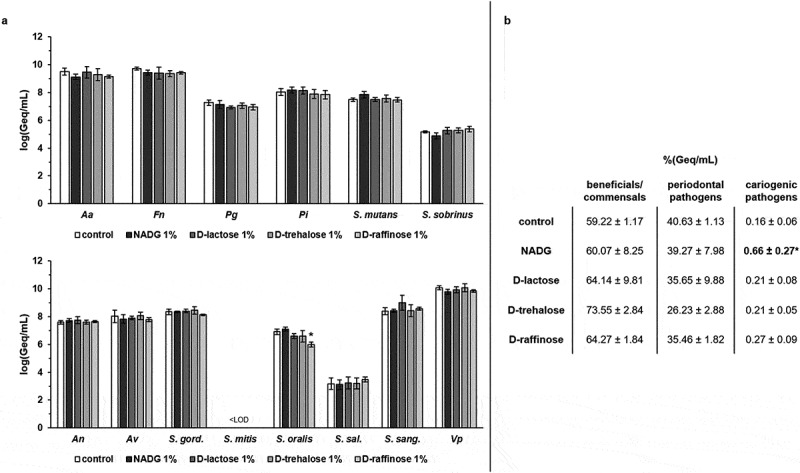Figure 2.

Effects of repeated rinsing with potential prebiotic substrates at 1%(w/v) on multi-species biofilm composition
Panel a: Absolute abundances of pathogenic oral species (periodontal and cariogenic pathogens) (upper graph) and beneficial/commensal oral species (lower graph) are shown as mean ± SD (n = 3) logarithmic values of the genome equivalents per millilitre (log(Geq/mL)). Panel b: Relative abundances of the different groups (beneficial/commensals, periodontal pathogens, cariogenic pathogens) of bacterial species are shown as mean ± SD (n = 3) percentage of the genome equivalents per millilitre (%(Geq/mL)). All substrates were dissolved in PBS at a concentration of 1%(w/v) (corresponding molar concentrations: 45 mM (NADG), 29 mM (α-D-lactose), 17 mM (D-(+)-raffinose) and 26 mM (D-(+)-trehalose)). Statistically significantly different values when compared to the control (PBS) are marked with ‘*’ (P < 0.05, ANOVA + Dunnett’s correction for simultaneous hypothesis testing). Aa: A. actinomycetemcomitans; Fn: F. nucleatum; Pg: P. gingivalis; Pi: P. intermedia; An: A. naeslundii; Av: A. viscosus; S. gord.: S. gordonii; S. sal.: S. salivarius; S. sang.: S. sanguinis; Vp: V. parvula; LOD: limit of detection (=2.65 log(Geq/mL)); NADG: N-acetyl-D-glucosamine.
